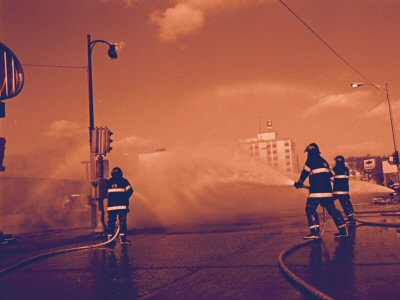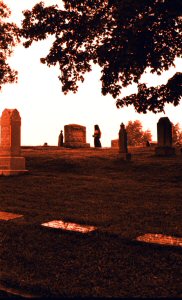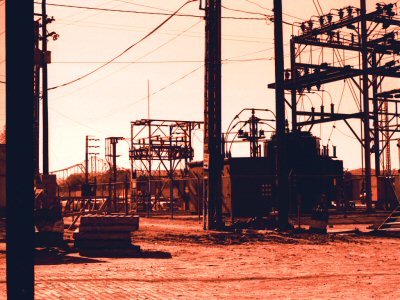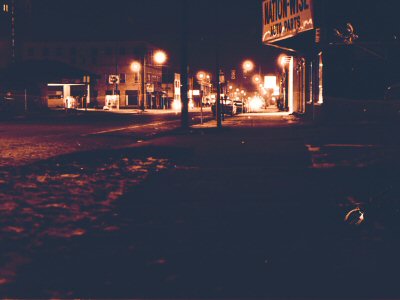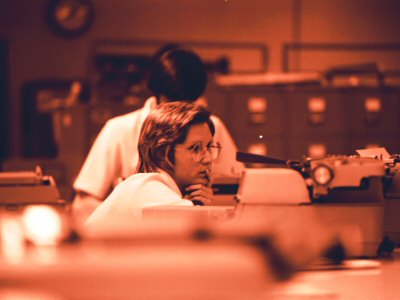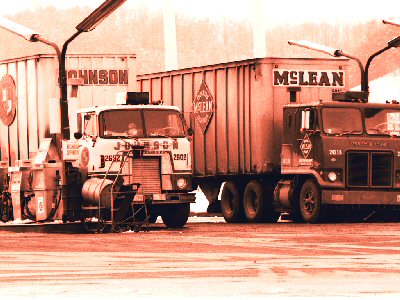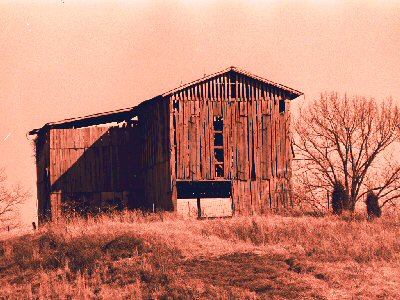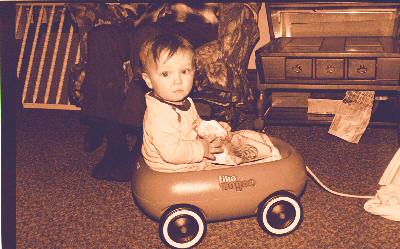8 Jul 2007
« Older Entries Newer Entries » Subscribe to Latest Posts
4 Jul 2007
The Runaway Asteroid
David Baumann, Mike Dodd, and Jonathan Cooper wrote a series of young-adult science fiction books called the “Starman Series”. The second volume in this series, The Runway Asteroid, can be downloaded as an audio book, free of charge, from:
http://www.archive.org/details/Runaway_Asteroid
We hope you enjoy it!
21 Jun 2007
Photographs by Earle Neil Kinder: Sitting Ducks
19 Jun 2007
Hiking in the Dark
It was a beautiful evening. Richard and I were deep in the woods, hiking down the side of a mountain. Pine trees covered the landscape as far as the eye could see. Overhead was a clear sky filled with brilliant, shining stars. There was no moon out, which allowed for a exceptional view of the summer constellations. We were miles from civilization and had been hiking for hours.
“They’re beautiful,” my enormous friend said softly. I never understood how someone of his vast weight could move so quietly.
“What are?” I asked.
“The stars.”
“Oh. Yeah, I suppose.”
“Do you think we’ll ever get to visit them?” he asked.
“I hope not,” I said, while carefully stepping over a hole in the ground. It was very difficult to see anything in the dark. “The stars are incredibly hot; why, if we ever set foot on one we’d be incinerated instantly.”
“But what about the planets that orbit them? Do you think we’ll ever get to visit them?”
“Probably not,” I said. “I doubt any working faster-than-light drives will be developed within our lifetimes, and it’s a little too far to walk.”
“Maybe so,” he said. We walked in silence for a few minutes. Richard took the lead, and I walked behind him. We slowly worked our way down the side of the mountain. There was a stream nearby – we could hear it – but in the darkness it was hard to make anything out. I kept tripping over things I couldn’t see, but my friend, for some reason I could not understand, was not having the same problem.
“But what about after we die?” Richard asked, breaking the silence. “Do you think we’ll get to visit the planets after we go to Heaven?”
“I have no idea,” I said. “It’s hard to say. It’s certainly a possibility.”
“I mean, you’ve go to do something up there, right? You can’t just sit around all day and do nothing. I’m sure there are jobs, and things.”
“I doubt you will be sitting on a cloud strumming a harp for eternity, if that is what you are getting at,” I said.
“Now there’s a question for you. What kind of jobs do you think people will do? Do you think there will be plumbers up there, or will I have to go back to school to get a new degree? What if they’re not using pipes in Heaven – what if they have nuclear assemblers, or something?”
“Then I guess you’ll have to become a baker instead,” I replied, as I ran right into a small tree I hadn’t seen.
“I don’t really like baking,” he said as he helped me off the ground. “Besides, how would I compete with people who had already been there for thousands of years? How could I ever get enough experience to get a competitive edge?”
“I’m sure you will think of something,” I said. “I wouldn’t worry about it. I bet there are more things to do than there are people to get them all done. I don’t know anyone yet who found serving God to be boring or unexciting.”
“And what about the language? I don’t suppose they speak English there. How long will it take to learn the local dialect?”
I grabbed Richard as he started to slide down the side of the mountain. It took all my strength to pull his enormous bulk back from oblivion. “Maybe you’ll just be born knowing it,” I said, gasping for breath. “Or die knowing it. Or something. The apostle John was able to talk to people in Heaven without taking any language classes. I think that’s a good sign.”
Richard thought a moment. “But think about it! You can’t just spend all of eternity sitting around on the beach. You’ve got to do something! I have no idea what my options even are. How can I possibly be prepared if I don’t know what to expect? How am I going to fit into society? What if I get bored? What if I spent my whole earthly life pursuing a job that doesn’t even exist in Heaven?”
“I don’t think it will really matter,” I replied. “I mean, you’ll have all of forever to figure something out. I wouldn’t worry too much about it. It’s not like you won’t have the time.”
“But what will I do? Aren’t you worried? I mean – that’s an awful lot of time!”
I shook my head – not that anyone could see me in the dark. “I’m not worried about it. I mean, think about it, Richard. Life on earth is all about serving God – all you have to do to get through life is walk with God. Life in Heaven will be no different. Sure, the landscape might be a little different, but the essentials aren’t going to change. There may be different props but it will be the same story. You’ll be fine.”
“That’s good,” Richard replied. “I was getting a little worried.”
All of the sudden a thought hit me. “You don’t think we’re going to get out of the woods, do you?”
“Well…” he began.
“I know we’ve been lost for hours, Richard, but I’m sure we’ll find a way out. That stream is around here somewhere; we just have to find it and follow it to civilization. I’m sure we will be fine.”
“Maybe so,” he replied, “but if you’re so confident then why are you growling?”
“I’m not growling,” I said.
“Oh,” he replied. “So who is?”
We stood still for a moment and listened. We could hear the wind blowing through the trees, and in the distance we could hear a stream gently flowing through the woods. We could also hear a growling in the distance – a growling that was steadily getting closer.
“I think it’s time to go now,” I said.
“I’m right behind you,” Richard called out.
15 Jun 2007
Belief
Rev. Bradley was walking downtown early one morning, on the way to a speaking engagement, when he heard a voice calling his name. The tall, thin pastor stopped and turned around, trying to figure out who had called out to him. Few people were out this early and he spotted the man almost immediately: a young, neatly-dressed individual with scruffy red hair.
“Good morning, Silas!” the pastor said as he shook the young man’s hand. “What brings you out so early on this fine and blessed morning?”
“Oh, I’ve got an appointment at the student loan office,” Silas replied. “Nothing too important. And you?”
“I’ve been invited to address the Lighthouse group at the college campus – they’ve asked me to come and speak to them about some issues going on in their lives. It’s exciting to watch the Lord at work.”
“Yeah, whatever. Say, Reverend: why do you bother with all that, anyway?”
“What do you mean?”
“Well, you know. I’ve been to your church before – don’t think I haven’t! – and while that’s all nice and good, I see that you keep trying to force your beliefs onto other people. You’re always going around and telling people that their beliefs just aren’t good enough. Why don’t you just stick to your crowd and leave other people alone?”
The thin pastor thought a moment before replying. “Do you remember how we met?”
Silas grinned, shaking his head. “Of course! I’ll never forget.”
“What happened that morning?”
“Oh, well, you know. We were in the park that morning, and you were – where were you – sitting in the park with your family. A little girl – I forget her name – had wandered into the road, and a big truck was headed her way. I went out, grabbed her, and pulled her away just in time. You came over to make sure that everything was ok and invited me to your church.”
“But why did you do it?” the pastor asked.
“What do you mean?” Silas replied.
“Why did you try to pull her out of the path of that truck?”
“If I hadn’t have acted she would have been killed instantly! That truck driver didn’t even see her. He didn’t even try to slow down.”
“But maybe she didn’t believe in trucks, Silas. How could you be sure that she even knew what a truck was?”
Silas gave the pastor an odd look. “What are you talking about, man? It doesn’t matter! If that truck hit her then she would have died on the spot.”
“But Silas,” the pastor said, “maybe she didn’t see the truck coming. The truck wouldn’t have harmed her if she didn’t know about it. That wouldn’t be fair.”
“Are you crazy? The moment that truck hit her – bam! – that would have been it. There’s no way she could have survived.”
“I just don’t know, Silas,” Rev. Bradley said thoughtfully. “She may have been a student of Eastern mysticism. Perhaps she believed that the road could be shared by both her and the truck – that mutual exclusions were a Western concept. By moving her you could have robbed her of an attempt to validate her beliefs.”
“You’re nuts,” Silas said. “Don’t you know anything? If you get run over by a truck that is moving at a high rate of speed then are you dead – d e a d, dead. Right there. Whether she saw it coming or not. What she knew about trucks didn’t matter a bit. I knew it would kill her, so I stepped in to save her.”
“Ah,” the pastor said. “I see.” He turned to leave.
“Wait!” Silas said. “You didn’t answer my question! Why do you bother with all that preaching stuff?”
“I’m with you, Silas,” Rev. Bradley said. “I think it’s a good idea to warn people that they are in the path of an oncoming truck – it’ll kill them for sure if they don’t escape.”
With that, he walked briskly down the street.
14 Jun 2007
Photographs by Earle Neil Kinder: Two Trucks
12 Jun 2007
The Curse
The planet was an absolute wreck. The whole landscape, as far as the eye can see, was shrouded in a black, acidic fog – the relic of some ancient disaster hundreds of years ago. Bare, jagged hills jutted out of the parched brown soil. The elegant terraces that used to cover the hills had fallen into complete disrepair. Only crumbling ruins remained of the mighty structures of steel and glass that had once formed sprawling cities. Everything looked dead, destroyed, and barren – the relic of a war long ago, perhaps, or of some mighty ecological disaster.
It was hard to say what had caused the devastation. I had discovered this planet a few years ago while looking for new source of iteria – a rare earth element that is highly useful in the production of antimatter. The probes I had sent out had flagged this star system as being of interest, so I came out to take a look at it. It turned out that the planet did not have what I was looking for, but it did capture my interest. At the time I was in too much of a hurry to follow up on my discovery, but when my life calmed down I came back to have another look.
The destruction that I found was simply immense – I had never seen an entire ecosystem destroyed before. The cities were in ruins, the fields were abandoned, and the atmosphere was slowly turning into poison. Thick, black pockets of some highly corrosive gas lingered in pools along the ground and seemed to eat alive the few ruins that remained. The sky was low, with fast-paced gray clouds covering an always-overcast sky. The air was hot and dry; it was breathable, but very unpleasant. I wore my spacesuit for excursions onto the surface and brought along my own oxygen supply.
The only plants that I could find were dry, half-dead weeds that were trying to eke out a meager existence in a few protected cracks in the mountains. I found a few sources of water but they were all polluted by a black, oily substance. The planet was so dead that not even insects could be found in abundance. Sand, wind, and a strange black gas combined to erode any surviving structures at a remarkable rate.
I landed my ship near one area of ruins and stepped outside to take a look around. For two days I found nothing, but on the third day something happened.
I was in the heart of what must have once been a giant city, trying to pick my way through a ruined courtyard, when a figure loomed up through the smoke. It was difficult to see through the black haze, but the figure appeared to be a man – a very old and thin man, eaten up with disease. I don’t know how long he had been watching me, but when I first noticed him he was already walking toward me. When he realized that I had noticed him he waved his bony arms and called out, but I could not hear him through my spacesuit.
I removed my helmet so I could hear him better. The atmosphere hit me immediately – it smelled terrible, and it hurt my throat to breathe it. If I wanted to talk to him, though, my helmet had to be off.
I walked toward him. “Hello there!” I said. “I’m Jones – a privateer. Who are you?”
The old man looked intently at me. “Nobody,” he said.
“What’s that?”
“The curse has destroyed us all!” he said, wheezing and gasping for air as he spoke. “There is nothing left!”
“It looks like you are still here, my friend. I didn’t realize that there was anyone left alive.”
The man laughed – a short, harsh laugh, that sounded more like a wheeze. “There is no one left alive,” he said in a voice that sounded like a rusty hinge. It was hard to make out what he was saying. “Only the dead remain.”
By this time I had made it over to him. We both sat down on a broken stone column. I took a good look at him: he looked very old and was clearly in poor health. His bones looked brittle and his arms and legs were incredibly thin. His skin was pale and wrinkled, and he was very dirty. It must have taken all of his energy just to walk across the courtyard. I could only imagine what a lifetime of breathing that air must have done to him.
“Where do you live?” I said. “Surely you don’t live in these ruins.”
“There is no where else we can live,” he replied, as his gray eyes looked into mine. He stared at me constantly, as if I was the first person he had seen in ages.
“Are you the only one left?” I asked him.
The man shook his head. “There are a few others, but we are all dying. The young are all gone – they were the first to go. When we are gone the planet will be inhabited only by the dead.”
“What happened here?” I asked, as I got out my water bottle and handed it to him. He shook his head and pushed it away.
“It’s no use,” he said. “It’s too late for us. The curse has taken us – and it will take you as well!”
“The curse?”
“Look at all of this! All of this,” he said, gesturing feebly around with his arm, “was once a city. Now it has been broken. I was once a young man; now I am old. Decay, ruin, and death!”
The man had a wild look in his eyes, and I wondered about his sanity. How long could a man live in a ruined world and retain his mind? Were there really others, or was he the lone survivor of some terrible catastrophe?
“I don’t understand, Mr. – what is your name?”
“The dead do not need names,” he said softly.
“Sure they do,” I said. “Everyone needs a name, and you look quite alive to me.”
He sat there in silence and said nothing. I noticed that he struggled to breathe. I was struggling not to breathe; the atmosphere was more than I could stand. I wondered how long it had taken him to get used to it, and if he even remembered what clean air was like.
“What’s this about the curse?” I said at last. “Was there a biological war fought here, or something?”
“The curse is greater than that,” he said. “It levels all; it destroys everything. It turns mountains into plains. It turns buildings into rubble! It turns rubble into dust! None can withstand it!”
“Was it a virus? A bomb? An invading alien army? Some new, unforseen threat, perhaps?”
“The curse is old,” he said. “Very old.”
I sighed. “But when did it start?”
“Ages ago. We were cursed long before my fathers were born. We fought it as long as we could, but we lost. All of our efforts could not stop it. It destroyed everything we had built.”
The old man looked at me and shook his head. “You don’t believe in curses, do you?” he asked.
“Not really.”
The man laughed again – or coughed; it was hard to tell. “You came here in a starship, yes?”
“That’s right.”
“Suppose you where to leave that starship parked in a field for five hundred years. What would you find after you came back?”
“A ruined ship, probably,” I said. “Time would have eaten it away. It would be worthless.”
“Why?” he asked.
“Oh, you know – the wind, and the rain, and the natural decay of things. Time takes its toll on everything.”
“But why?”
“Why?” I looked at the old man again. “That’s just the natural order of things. Time eventually destroys everything.”
“And you think nothing of it!” he shrieked. “The universe is running down! Everything is being destroyed! Why should it be that way? Why should we be cursed so? Why must everything come to ruin?”
“It’s just how the universe works,” I said. “There is nothing unusual about it.”
“There is everything unusual about it! If you lived on a planet where the sky was pink with black stripes, you would think it was the most natural thing in the world. If the sky one day turned to a deep blue you would panic and think that the world was ending. The curse is only normal because it’s all you have ever known! Why should it be that way? Why?”
“You mean that is your curse? You believe that things running down is a curse?”
The old man sighed. “One day you will understand. You have not seen a civilization decay into the dust, but you will. All civilizations die. All people die. All buildings die. Nothing lasts – the curse destroys everything. It cannot be defeated. It cannot be stopped. All you can do is hope that it does not hit in your lifetime. But us – we were not so lucky.”
“That is an awfully depressing outlook to have on life,” I said. “You need to think a little more positively.”
“I watched as our institutions decayed; as the safeguards that protected our way of life were slowly eaten away. I watched as our families disintegrated, as our nations gave way to chaos, and as the atmosphere was poisoned. I watched as it was all lost. In fifty thousand years there will be nothing left to indicate that anyone ever lived on this planet.”
“Of course not,” I said. “That’s just the natural order of things.”
“And suppose you had been born with two heads,” he replied. “Would that, too, just be the natural order of things?”
He walked away into the distance, and then was lost in the smoke. I called out to him, but he did not respond.
I saw him again the next day. “You are still alive,” I said.
“And so are you,” he replied.
“I still don’t know your name.”
The man sighed. “You can call me Jonas.”
“Jonas it is, then,” I said. There was silence for a few minutes, and then I spoke. “You don’t have to stay here, you know. You could come back with me in my ship. There is room on board for you and your friends.”
Jonas shook his head. “What would be the point? Death will take us all in the end. There is no place we can go to escape death. It is useless to run or hide.”
“Maybe so,” I said, “but I know someone who has defeated it. I have met someone with the power to roll back this curse of yours – someone who has defeated death, and who has promised to help you, if you will let him.”
The man looked at me, surprised. “And who can do this?” he asked.
“Let me tell you about him,” I said.
10 Jun 2007
Photographs by Earle Neil Kinder: The Curse
8 Jun 2007
Social Justice
Mr. Herringsworth walked briskly into the drab concrete room in which his client, Eric Brooks, was already seated. A quick glance showed him that aside from his client, the dingy holding room contained only a small concrete table and two rickety plastic chairs. The policeman who escorted the lawyer into the room stepped outside and shut the door behind him.
The primly-dressed lawyer saw that his client had taken a seat in one of the chairs at the table and was holding his head despondently. Mr. Herringsworth calmly sat down opposite him and placed his leather briefcase on the table.
“You’ve got to help me, Bob!” his client said as soon as Mr. Herringsworth had taken a seat. “They’re threatening me with jail time – jail time! And me, as innocent as a lamb.”
“Of course,” the lawyer replied, as he opened his briefcase and rummaged through it. “All you did was – let’s see – ah, here is your file. You broke into a house, stole $15,000 worth of equipment, burned the house down, ran over three police officers trying to escape, and caused a five-car traffic accident. Whatever possessed you to break into the home of a police officer, Eric? Couldn’t you have at least waited until they left the premises?”
“I didn’t know they were still home,” Eric said. “I was drunk at the time. You can put that in my case – temporary insanity. They’ll let me off for that.”
Mr. Herringsworth shook his head. “Just what were you trying to steal, anyway? Based on the list the police gave me it looks like mostly electronics equipment.”
“I was just trying to even things out a bit,” Eric replied. “They had all kinds of expensive toys – insured, too, I bet. I just wanted a piece of it, that’s all. I’m sure that their insurance will pay them back. There was no harm done.”
His lawyer shook his head. “Your method is insane. Whatever convinced you that burglary was the right approach? If Officer Connors had preloaded his shotgun before you broke into his house we wouldn’t even be having this conversation. Your organs would have become a permanent part of his living room décor.”
Eric winced at the thought. “You’ve got to do something about that, by the way. See if you can prosecute him for breaking gun-control laws. Guns are dangerous – someone might get hurt! It’s just not safe out there for a burglar anymore.”
“I’m sure that the courts are very interested in taking guns away from police officers,” his lawyer replied. “That’s going to go over exceptionally well.”
Eric glared at him. “Fine, then. What would you have done, Mr. Moneybags?”
The lawyer leaned back in his chair and looked at him. “If you really want to have someone else pay for your big-screen TV then you need to approach the situation from the angle of social justice.”
“Social what?”
“Social justice! The fact that you have less than your neighbors is unjust, Eric – you’ve been wronged! Society has let you down and you’ve become a victim of circumstance. You need to talk to a few reporters and tell them how you are just trying to earn a meager living while the high-rollers down the street are living it up with huge TVs. Tell them that it’s not far that they have things that you don’t. Get the reporters to write stories on the huge gap between the rich and the poor, and the great unfairness of it all.
“With a little effort you could get a nationwide campaign going and form some special interest groups! The groups could then pressure politicians to increase taxes on the wealthy and give that tax increase to you – in the interest of fairness, of course. You can then use that tax increase to get the things that you could never have afforded before.”
“That seems like a lot of work,” Eric said.
“But think of the benefits! If you had done it that way then you would have had the police power of the state behind you. If Officer Connors had refused to pay his taxes in order to fund your new TV the government would actually go into his house, arrest him, and take away everything he owned. Not only would you have your TV but the police would actually arrest anyone who tried to stop you from getting it.”
“Hmmm,” the burglar replied thoughtfully. “So instead of being behind bars – ”
“You would be at home right now, watching a TV paid for with someone else’s money.”
“Beautiful,” Eric said. “This opens up whole new horizons! My car payments, medicines, insurance – ”
“You got it,” his lawyer replied. “You would have had everything paid for.”
“Wow. That’s amazing! You mean to tell me that method actually works?”
“Think about it,” Mr. Herringsworth replied.
-
Browse
or Tag Cloud
artwork at the end of eternity beyond the farthest star earle neil kinder in the city of tomorrow jack falcon kings oddities photo randomly generated books science fiction second coming short story starman series stryker series theology the war of the artilect Tom Swift and His Claytronic Stones Tom Swift and His Nuclear Hyperplane tom swift jr

